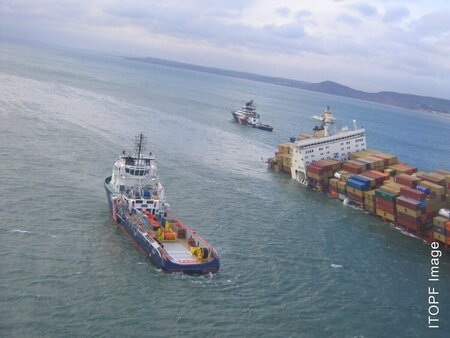MSC NAPOLI, United Kingdom, 2007
18 January 2007

Incident
On Thursday 18th January 2007, the container vessel MSC NAPOLI (4,668 TEU, 53,409 GT, built 1991) suffered structural damage while transiting the English Channel in heavy weather. After the crew abandoned ship, the vessel was taken under tow by French tugs towards shelter at Portland Harbour (UK). However, during the early morning of Saturday 20th January, its condition worsened, and the decision was taken to beach the vessel on a sand bar in Lyme Bay near Seaton, Devon. Once aground, the vessel developed a list, causing the loss of 117 containers. At the time of the incident, MSC NAPOLI had on-board ~3,200 tonnes of heavy fuel oil (IFO 380), around 200 tonnes of lube oils and marine diesel as well as some 2,318 containers, 158 of which contained dangerous goods. Both the UK and French coastlines were affected by the pollution with the main contamination from tarballs and debris from lost containers washing ashore, some of which was contaminated by oil.
Response
Oil started to leak from the casualty while in distress in the English Channel. Once aground, a continuous release of oil from the vessel threatened the Dorset & Devon Heritage Coast and Lyme Bay’s protected habitats, including several Sites of Special Scientific Interest (SSSI), migratory bird habitats and protected shingle beaches. However, favourable weather conditions during the following two weeks pushed the oil offshore and the recorded shoreline impact from the oil pollution was minimal. Some containerised debris was recorded as stranding on the Brittanny coast in France.
At sea, several French and UK spill response vessels were mobilised to contain and recover spilled oil. Dispersants were also applied for a short period of time. The shoreline clean-up consisted of mainly manual recovery of the container debris. Protective booming was set up at the entrance of coastal inlets near the casualty. With a number of holds flooded and the engine room tidal, the cargo had to be removed from the casualty at the grounding site by crane barge and loaded to transport barges to be shipped ashore at Portland. The last container was removed from the flooded holds on 18th May 2007, with the focus then shifting to the recovery of sunken containers from the seabed and wreck removal. Explosives were used to break the wreck into two pieces with the bow section being towed to Belfast for recycling while the stern section was dismantled in situ.
This incident highlighted the importance of granting a place of refuge to a stricken vessel. The decision made by the UK SOSREP to beach MSC NAPOLI was considered key to the success of the response, mitigating the oil and cargo spill and facilitating the removal of both the containers and the bunker fuel. This response also illustrated the close co-operation between neighbouring countries undertaking search and rescue, emergency towing and oil spill response under international agreements (incl. Manche Plan).
ITOPF Involvement
ITOPF was mobilised to site as soon as the emergency grounding was decided. ITOPF joined the salvage control unit and marine response cells, closely liaising with the environment group and management units for both the Devon and Dorset County Councils. Apart from assistance regarding appropriate response measures for the dangerous goods carried onboard, advice on response strategies included oil spill response decision-making such as the potential use of chemical dispersants on leaking fuel oil, which required detailed evaluation in the prevailing winter conditions.
ITOPF subsequently assisted the casualty’s P&I Club with the assessment of claims from UK and French authorities.
LINKS
Steamship mutual: http://www.steamshipmutual.com/publications/Articles/Napoli1008.html
Categories: United Kingdom, HNS, Oil, Container Ship, Europe
